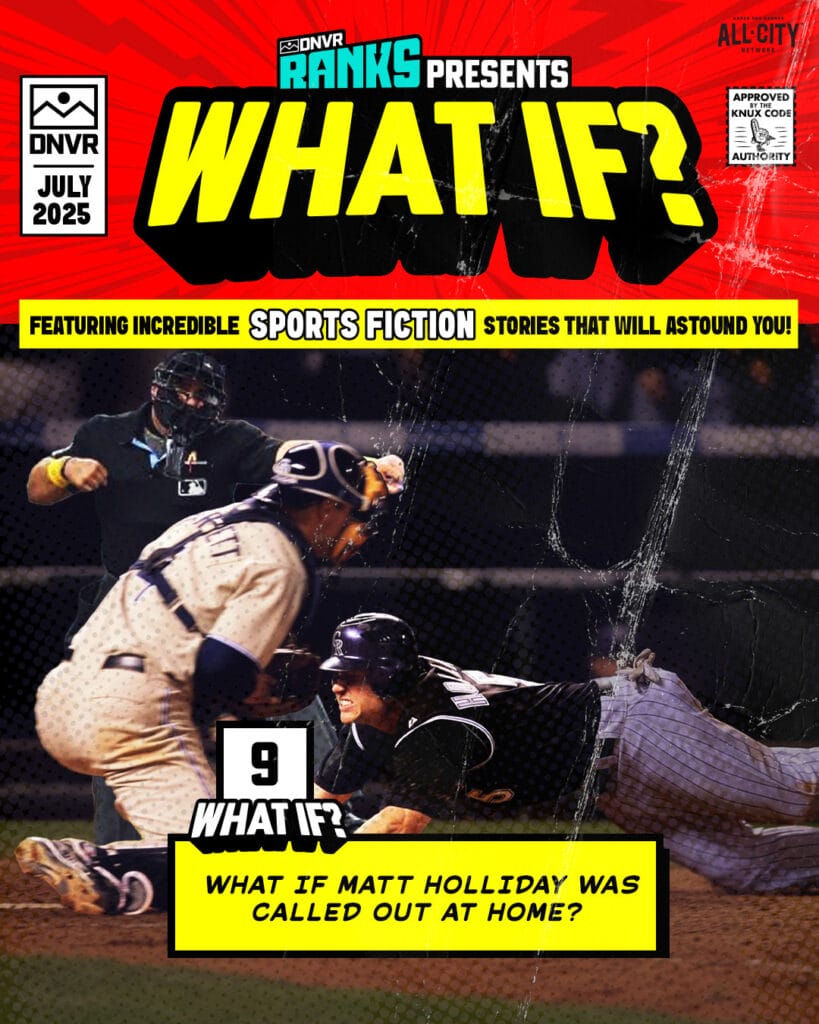© 2026 ALLCITY Network Inc.
All rights reserved.
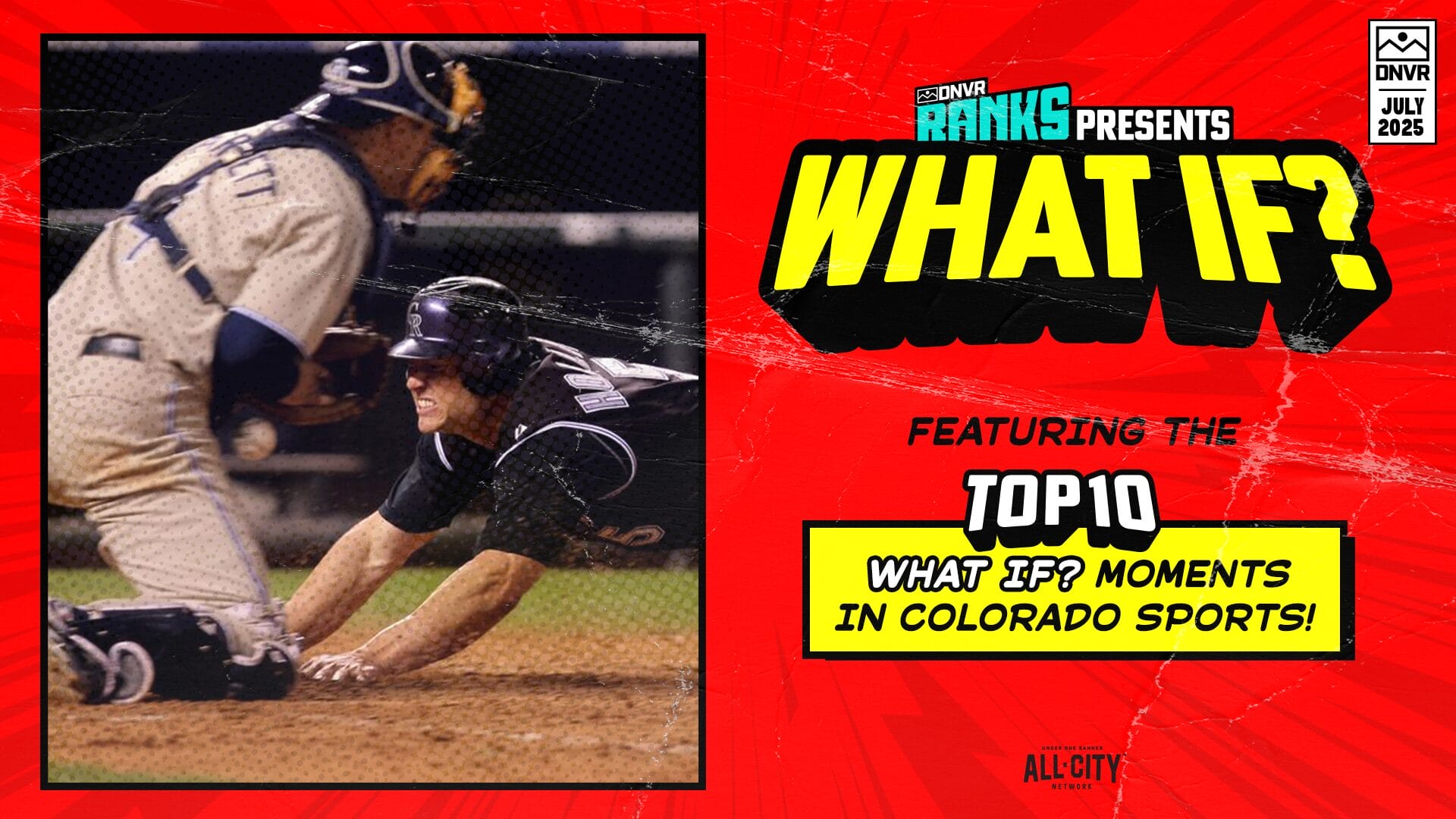
You just can’t help it as a sports fan. It’s not enough for us to watch the games, follow the trades, free-agent signings, or get overly invested in the future of teenagers on draft night. We don’t just live to tell the tales of what happened. No, spinning the yarn of what could have been goes hand in hand with the lived experiences of every sports fan.
Sure, this team lost that one game, but what if they hadn’t? Can you imagine if my team hadn’t gotten such lousy lottery luck that one year? What would my world look like if that one key player hadn’t gotten injured? Everything would be different!
And that’s the ambitious project we here at DNVR decided to embark upon for this year’s Rank Week. We’ve done the best athletes and most memorable games, but those are easy enough. We saw those happen. What about the alternate universes that we all think about but didn’t get to live in?
Colorado sports fans, we give you the top “What If?” moments in Colorado sports history.
(This list will be updated throughout the week with “What If’s” #1 and #2 released Friday.)
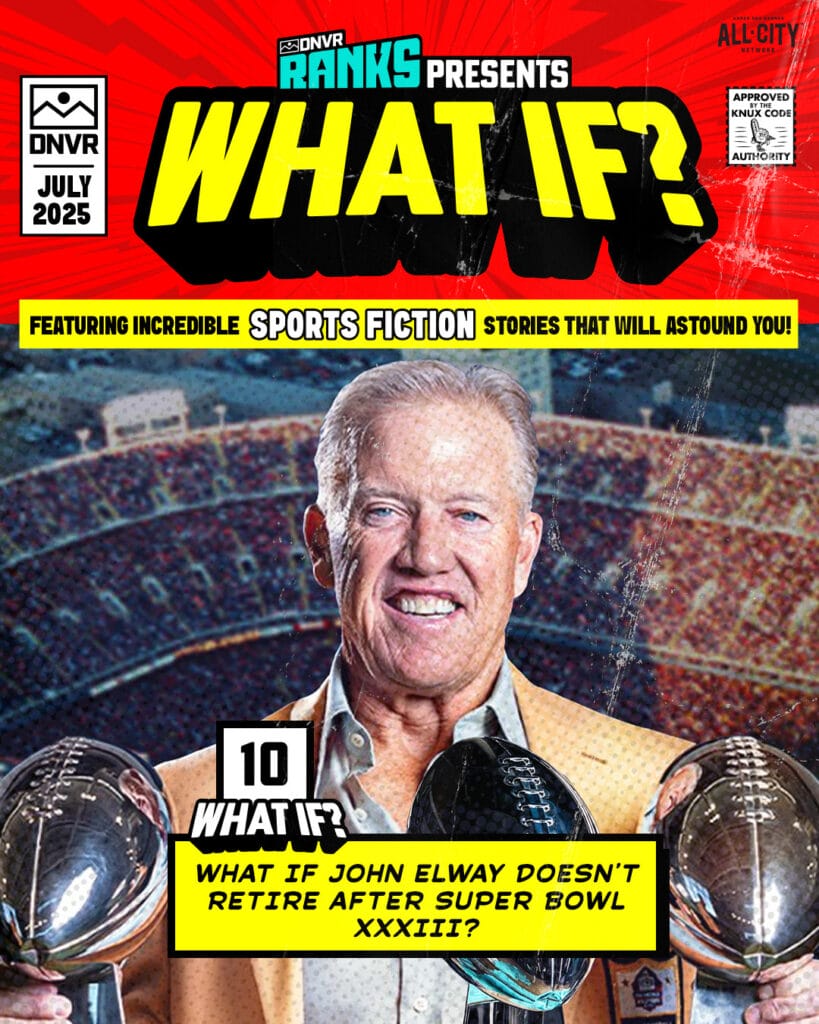
There have been some valiant attempts at the vaunted “three-peat” in NFL history, but no team has ever won three consecutive Super Bowls. Back when John Elway was quarterbacking Denver Broncos and was joined in the backfield by Terrell Davis, they won Super Bowls 32 and 33. There was a genuine belief that Mike Shanahan could coach the Hall of Fame 1-2 punch to a third Super Bowl.
While there was a lot of talk leading up to Super Bowl 33 between the Broncos and Atlanta Falcons that it would be Elway’s final game, Elway himself wasn’t quite sure. When he eventually won Super Bowl MVP after going 18-for-29 and throwing for 336 yards, including an 80-yard touchdown to Rod Smith, the conversation was about what special run it was for Elway and the Broncos. The hard-luck loser early in his career was going out on top after winning consecutive championships.
What if he didn’t? The Broncos still had Davis, who had won the regular season MVP after eclipsing the rarified air of the 2,000-yard club, and was one of the game’s premier backs. Shanahan’s brilliance on the headset was just beginning and Elway was the guy to bring it all together. Without Elway, the Broncos went with second-year pro Brian Griese behind center and it was his ill-advised throw that resulted in the devastating knee injury that derailed Davis’s career.
If Elway stays, does Davis ever get hurt? Does he continue to dominate with Elway only having to serve as a high-level counterpart and not the main player? Certainly, the Broncos would have done better than the 6-10 record they managed but it isn’t hard to envision Elway and a healthy Davis bringing that team to the mountaintop for a third time, cementing itself as the truest dynasty in league history.
-AJ Haefele
Back in a time when replay review was still a foreign concept, destined for a distant future of pitch clocks and pitch comms, the play at the plate with Matt Holliday was decided solely by the naked eye of home plate umpire Tim McClelland. It remains one of the bigger in-game controversies in baseball, and for good reason.
The Rockies aren’t a franchise known for deep-rooted history. As a franchise celebrating its 30th birthday in 2025, you could make the argument that by 2007, the organization had yet to find its defining moment. The team made the playoffs back in 1995, but that celebration was short-lived after getting bounced in the divisional round by the Braves.
The Rockies wouldn’t grace the playoffs again until that day in 2007 when Matt Holliday did (or did not) touch home. But I’m not here to debate whether or not Holliday was safe or out. I’m here to talk about the impact that single play made on the franchise we see today.
READ: What if Matt Holliday was called out at home? -Christian Saez
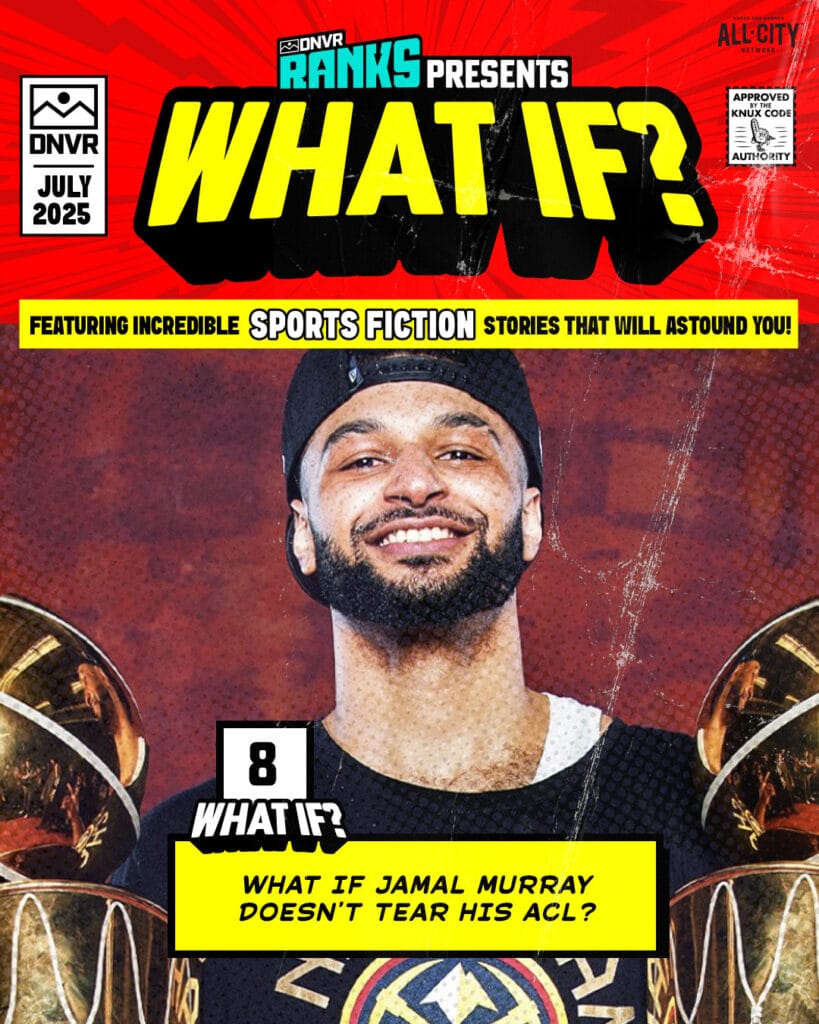
At the 2021 NBA trade deadline, the Nuggets landed THE perfect fit at power forward next to Nikola Jokic: Aaron Gordon. Denver won 7-straight games after acquiring Gordon from Orlando and looked like true championship contenders for the first time in the Jokic era.
But on April 12, 2022 in the fourth quarter of a loss to the Warriors, Jamal Murray drove down the lane, planted on his left leg, and then crumbled to the floor. It was a torn ACL. Murray didn’t just miss the upcoming playoffs where the Nuggets still beat the Trail Blazers in Round 1 before getting swept by the Suns in Round 2. He also missed the postseason the following year.
It was two unexpected gap years right in the middle of Nikola Jokic’s prime. Jokic won his first two MVP’s in 2021 and 2022 — the two playoffs that Murray missed due to the ACL. The Nuggets roster in both those season would have been championship quality with Murray, but without him, the Nuggets were just another playoff team.
If Murray had stayed healthy, it’s not hard to envision the Nuggets winning two championships in this current era. Maybe even three.
–Harrison Wind
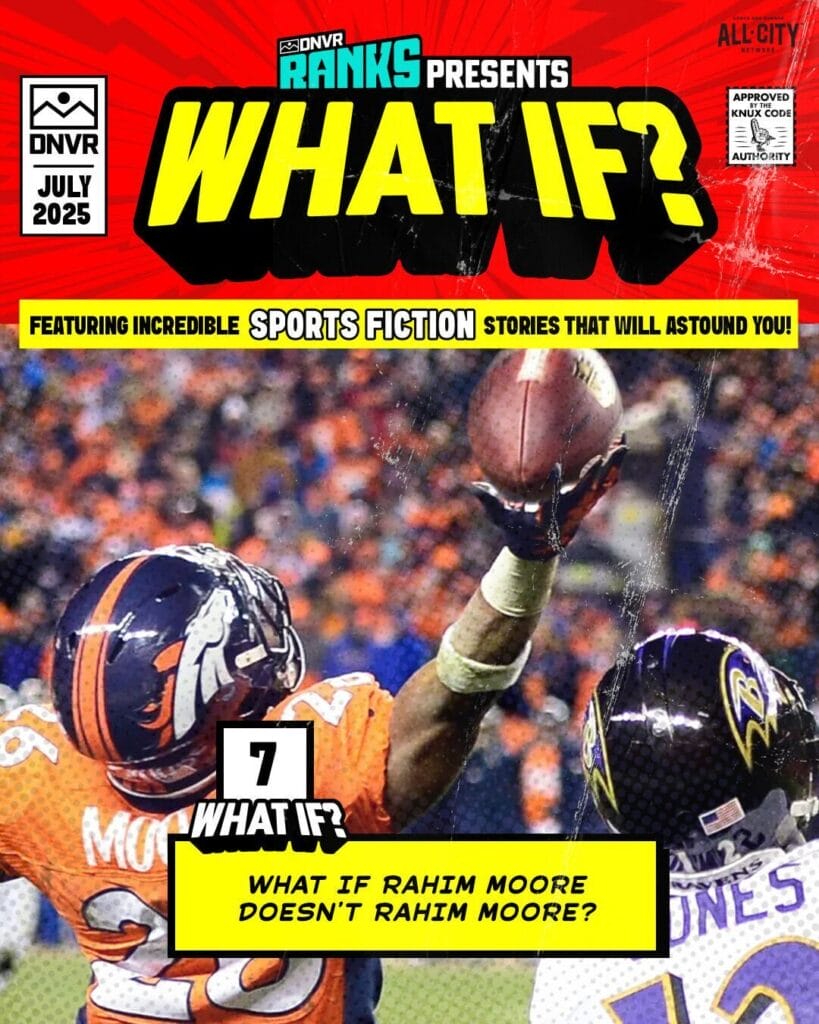
On third down, Flacco dropped back again. Robert Ayers spun through the middle of the line, forcing Flacco to step up. Flacco used his momentum to heave a deep ball up the right sideline.
The receiver was covered. Moore, was playing deep and had an angle to knock the pass away.
But he didn’t.
Instead, Moore took too steep of a route as he tried to undercut the throw. He jumped but the ball flew over his head. Jacoby Jones caught it and ran the final 20 yards into the end zone. The game was tied. An hour later, Justin Tucker would make the walk-off, game-winning field goal to send the Ravens to the AFC Championship Game.
And the Broncos would head back to their locker room for the final time that season.
“I’m taking the blame for it. Hey, I lost the game for us. It is what it is,” Moore told the Denver Post’s Mark Kiszla. “I misjudged it, man.”
What if Moore hadn’t misjudged the pass?
READ: What if Rahim Moore had made the play? -Henry Chisholm
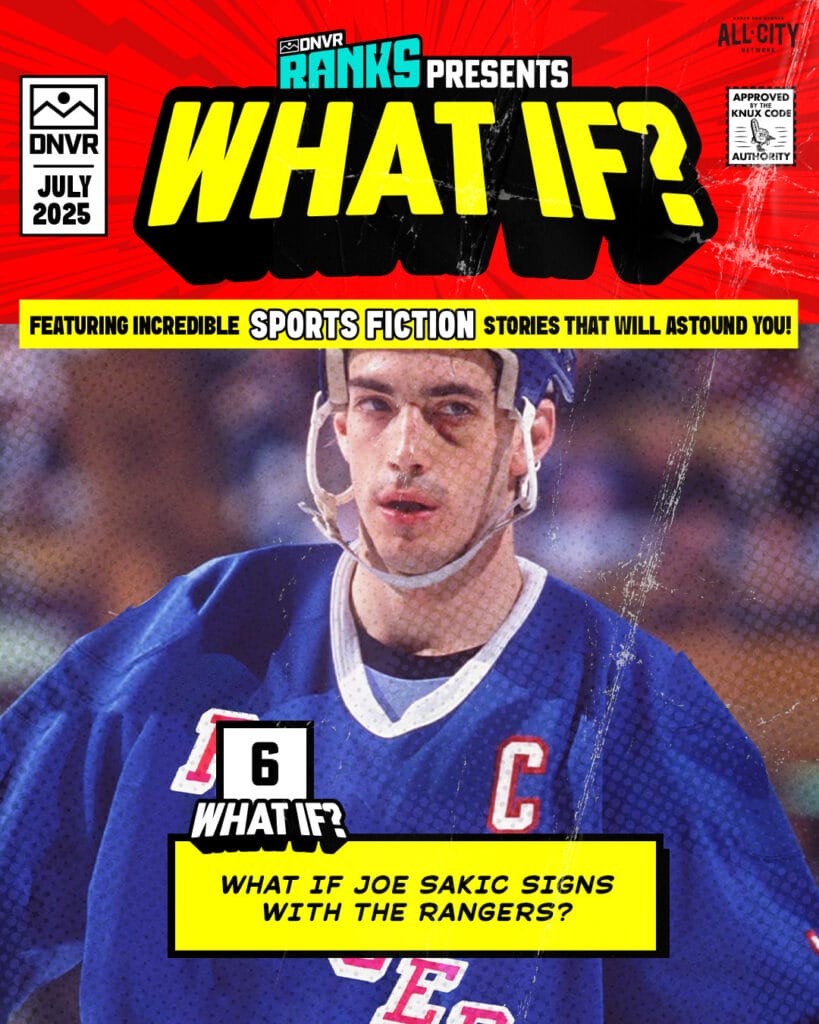
When the Quebec Nordiques moved to Denver, they were already captained by a young superstar who was in his prime in 26-year-old Joe Sakic. The first captain of the Avalanche exploded onto the scene in Colorado’s first year, scoring 51 goals and 120 points as he led the Avs to the first major pro sports championship in Denver’s history.
Already on a Hall of Fame track, Sakic hit restricted free agency in the summer of 1997. That’s when the New York Rangers and their deep pockets came calling. They signed Sakic to a three-year, $21 million deal. The contract was front-loaded with a $15M “poison pill” that would have made it very hard for the Avs to match. Colorado had seven days, and the story of how they got it done was made into a documentary that is wildly entertaining if you’re interested.
We’re here asking the hard question: What if “Air Force One” was a flop and the Avs couldn’t keep Sakic? What if the Rangers successfully replaced Mark Messier with Sakic, leaving the Avalanche without a captain?
The Avs wouldn’t have been without star power as Peter Forsberg, Patrick Roy, and Adam Foote were still around, but you obviously don’t lose a player (and person) of Sakic’s caliber and keep on truckin’.
The story around the organization is that Sakic simply wasn’t going anywhere. They would have moved heaven and earth to keep him, so this “What if?” is as much about what the Avs would have needed to do in order to keep him. The cost would have been significant. Claude Lemieux? Gone. Valeri Kamensky, Adam Deadmarsh, Sandis Ozolinsh, Keith Jones? All would have been in serious peril.
Had Sakic actually been allowed to leave? The Avalanche, frankly, may not have stayed in Colorado. They were having serious financial problems as it was and losing a superstar of Sakic’s caliber just two years into their Denver tenure might have spelled the end of the team in Colorado.
Let’s assume the Avs weathered that storm (avalanche?) and stayed in Colorado. What might have been with the Avs could have mirrored what has happened with the Rangers since their ill-fated offer sheet was matched. Sakic has haunted the Rangers…basically forever. That could have been Colorado’s fate.
Yikes. Big yikes.
-AJ Haefele
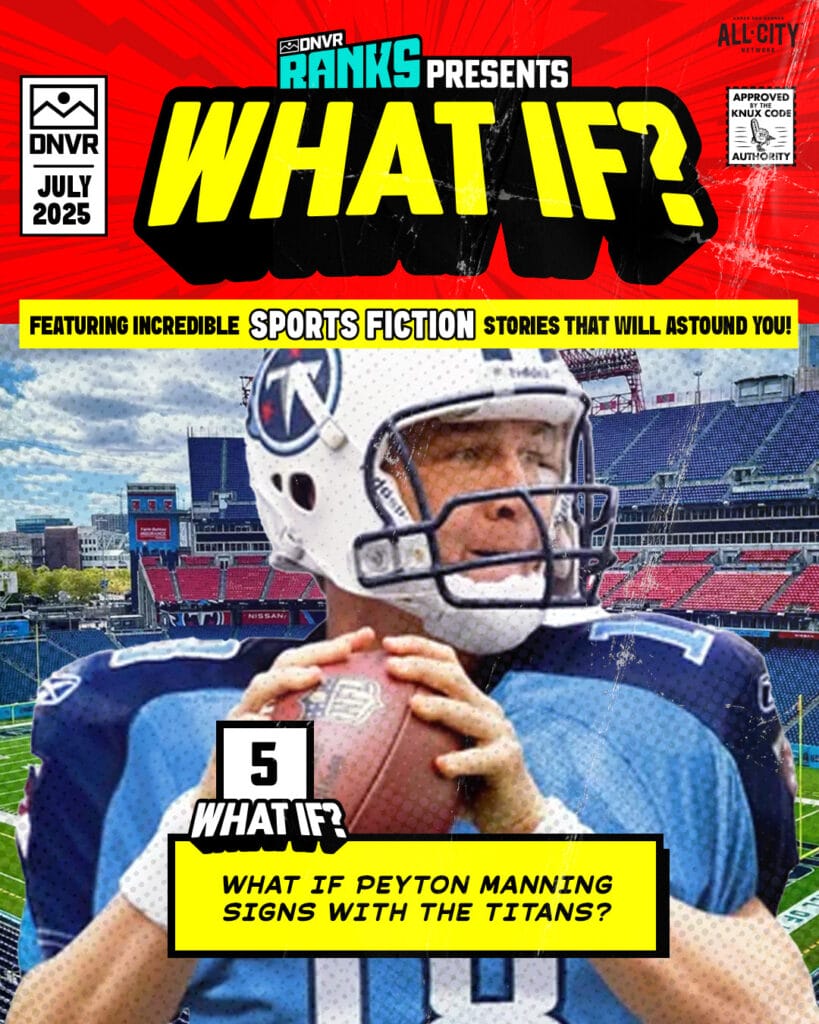
Remember that world where Tim Tebow was the lightning rod of a quarterback who couldn’t play for three quarters and then turned into a demigod in the fourth quarter and shocked the world with his penchant for clutch play late in games?
And remember how fun that one playoff run was, culminating in Tebow connecting with Demaryius Thomas for an 80-yard touchdown to open (and close) overtime of the first round of the NFL Playoffs against the Pittsburgh Steelers? Remember all of those things?
Tebow’s time in Denver came to a screeching halt when Peyton Manning was brought to Denver. Manning was cut loose by the Indianapolis Colts amid uncertainty over his ability to continue to play following three neck surgeries in 19 months and, without him, the Colts sank to the bottom of the NFL standings where they were rewarded with the number one overall pick in the NFL Draft, which they used on Stanford QB Andrew Luck.
Considered an elite prospect, the Colts couldn’t pass up the chance to turn the franchise keys over to Luck and they moved on from Manning. Suddenly in free agency, Manning chose the Broncos over a slew of suitors, including the Miami Dolphins, Arizona Cardinals, and Tennessee Titans. Manning’s addition led to the Broncos jettisoning Tebow to quarterback purgatory, the New York Jets, where he quickly flamed out.
What if Manning had chosen the Titans?
Not only would a different AFC team have gotten a motivated Hall of Fame quarterback to fuel their franchise, but the Broncos would have potentially stayed the course with Tebow. Now, that wouldn’t have magically made Tebow an accurate quarterback, but there was just always something about Tebow that was fascinating to watch, especially late in games.
Of course, it helped to have an excellent defense that kept the games close while Tebow spent three quarters floundering, but this became a “butterfly effect” moment in NFL history. Manning went on to set an NFL record for passing TDs in a season, led the Broncos to two Super Bowl appearances (one victory and one game we don’t talk about), and gave the Broncos another golden era to bask in before following John Elway’s lead and riding off into the sunset, Vince Lombardi Trophy in hand.
Without him, Tebow probably flames out (seriously, he just couldn’t consistently throw) and the Broncos would have gotten on the QB carousel they found themselves on post-Manning retirement. If you’re curious (that’s what this entire experiment is about, after all), the top QB available in the 2013 NFL Draft was EJ Manuel, who was drafted 16th overall by the Buffalo Bills, so it’s not like the Broncos would have had an easy shot at a top QB immediately had Manning never come.
We just wouldn’t have had the special moments we got with him and all of those Denver-based Papa John’s franchises would be owned by someone else.
-AJ Haefele
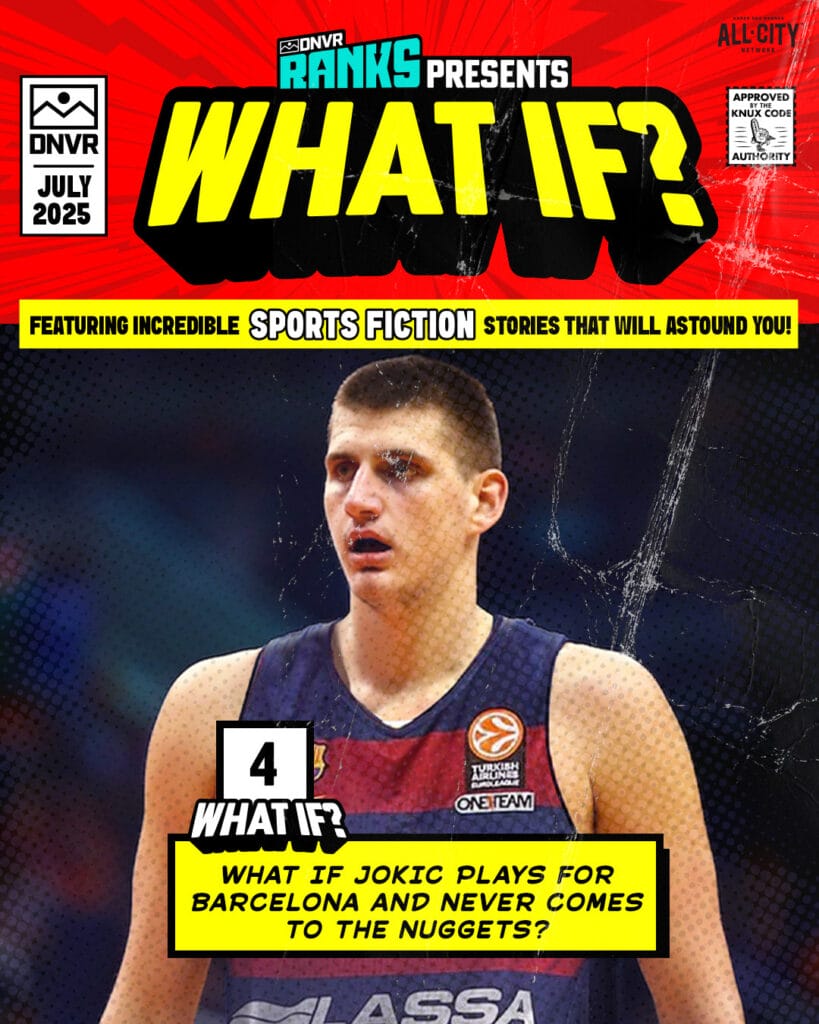
There’s a make believe Nuggets timeline without Nikola Jokic that exists, and it originates around a game that Jokic played for his Serbian club before he came to the Nuggets.
Denver selected Jokic 41st overall in 2014, but he didn’t come over to the NBA until a year later. He played the 2014-15 season in Belgrade and actually won Adriatic League MVP. European teams took notice. Barcelona, a European powerhouse, was so impressed by Jokic’s play that they wanted to ink him to a contract to play in Spain.
But Jokic played what he called one of the worst games of his career right before he was supposed to sign with Barcelona. All of a sudden, Barcelona went radio silent. The offer wasn’t there anymore.
The Nuggets then swooped in and signed Jokic to a contract to bring him to Denver, but they were almost too late.
Even though the Nuggets held Jokic’s draft rights, who knows what his future would have been if he got to Barcelona? Jokic has always said that he only ever envisioned playing at the highest levels in Europe. He never dreamed of the NBA.
You have to wonder if Jokic would have been cool playing in Europe for most of his career. Maybe he never joins the Nuggets, or maybe he doesn’t until later in his career.
-Harrison Wind
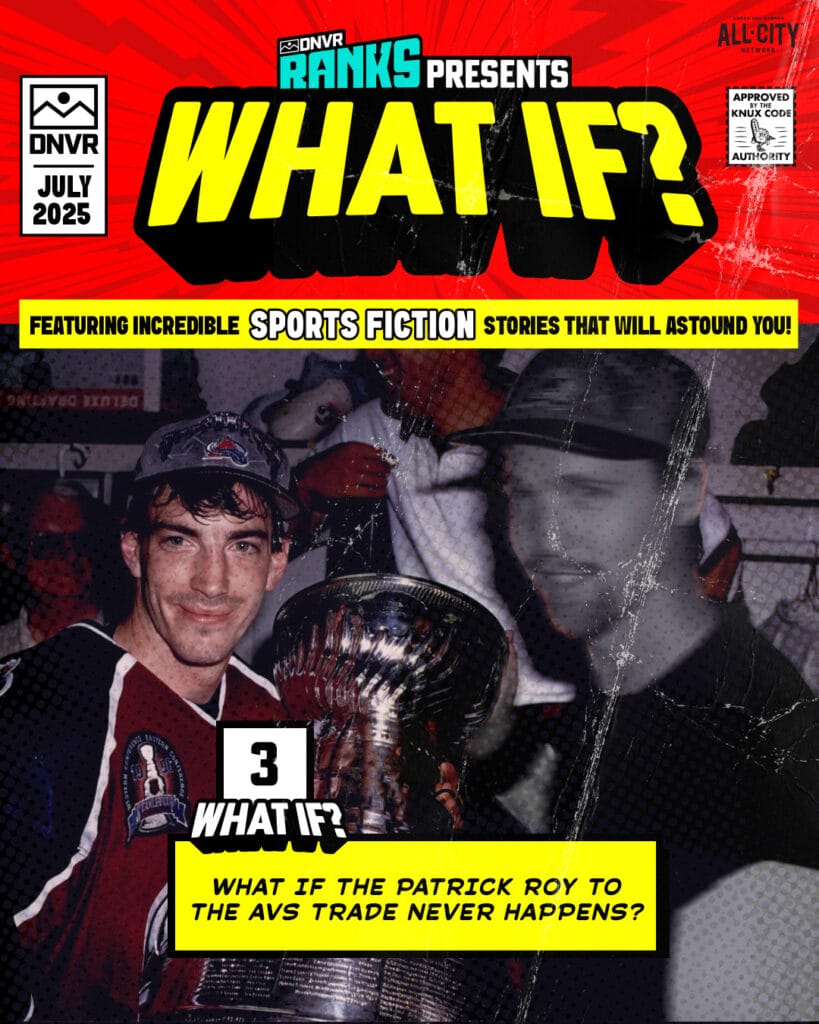
While Stephane Fiset was a solid starter for the Avs, the real prize was youngster Jocelyn Thibault, who was just 21 years old and was the 10th overall selection back in 1993. The Canadiens felt they were replacing Roy with what they hoped was their next franchise goaltender.
When the deal ultimately came down, Lacroix twisted Montreal’s arm into including their captain, Mike Keane, and secured the kind of paradigm-shifting trade that would come to define both franchises for the next decade. Roy backstopped the Avalanche to two more Stanley Cups and became the lone player in NHL history to win three Conn Smythe Trophies.
Montreal, meanwhile, sunk from greatness and watched as Thibault wilted under the pressure to replace Roy and became a journeyman goaltender. The trade is largely considered one of the great swindles in NHL history.
What we’re doing here today is asking the grand question, “What if Montreal didn’t lose their damn mind and trade the greatest goaltender in NHL history?”
READ: What if the Colorado Avalanche didn’t trade for Patrick Roy? -AJ Haefele
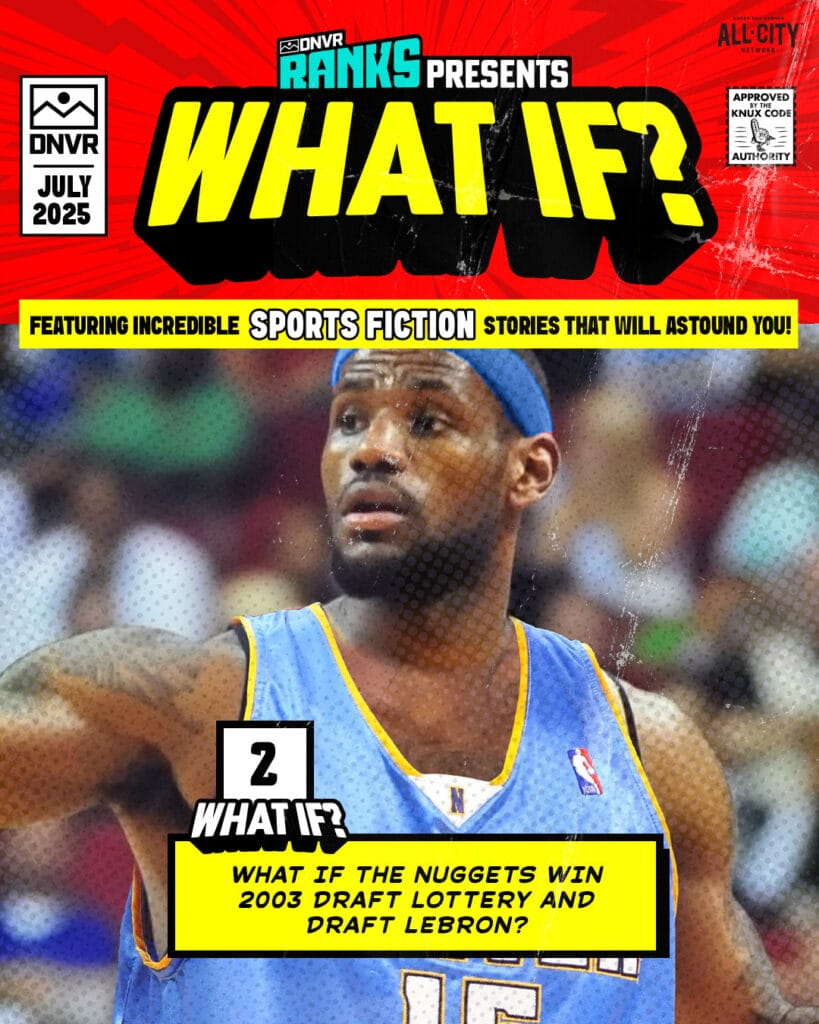
It’s amazing that a realistic possibility of the Denver Nuggets selecting LeBron James isn’t number one on this list, but that’s the breaks when John Elway (and maybe the future of pro sports in Denver?) is involved. Long ago anointed “NEXT” by ESPN The Magazine, James is one of the few players in sports history who were considered future superstars in their sport and lived up to the incredible hype attached to them.
Everyone in the NBA knew that James was the prize of the 2003 NBA Draft, so the Nuggets were comfortable being awful in 2002-03. They had a rookie head coach in Jeff Bzdelik who seemed an awful lot like a placeholder while the organization rebuilt. In the 2002 draft, the Nuggets were very active, drafting Georgian Nikoloz Tskitishvili fifth overall and swinging a trade with the New York Knicks for Marcus Camby and the seventh pick that year, Nene Hilario.
Those were the building blocks for the future, but the real prize was James. So, the Nuggets were terrible. Really terrible. They won just 17 games that season, finishing tied at the bottom of the NBA standings with James’s hometown Cleveland Cavaliers. That split the odds of winning the lottery evenly with the Cavs. Fittingly, the Nuggets and Cavs also split their season series, 1-1, with each team winning at home.
The Nuggets not only didn’t win the lottery, they dropped to third overall and the Memphis Grizzlies watched in horror as a trade from years ago came back to hurt them and give the Detroit Pistons the second overall pick.
In the end, the Nuggets did well for themselves, selecting Syracuse star Carmelo Anthony and he immediately led the Nuggets back to the postseason. The Nuggets never got the championship they envisioned, but it isn’t hard to see where the Nuggets get a little better lottery luck (something they’ve never had) and get the first overall selection and the chance to select James.
Obviously, a lot changes in that world. James is one of the best players in NBA history and was unbelievable right away in his career. The Nuggets have a foundational piece in James and a player who would go on to be great for them in Nene. Tskitishvili is one of the biggest busts in NBA history, so there was no undoing that in this exercise, but I think with James in tow the Nuggets would have been fine.
What I do think is inevitable is that the player empowerment era that began with James and his decision to leave Cleveland and head to the Miami Heat probably still happens. The real question for me is if the Nuggets would have put a better roster around James than the Cavs did.
Also, the path to a championship would have been significantly harder out West, thanks to the San Antonio Spurs (led by Tim Duncan), Los Angeles Lakers (led by Kobe Bryant), Dallas Mavericks (led by Dirk Nowitzki), and the Phoenix Suns (led by Steve Nash). That’s a murderer’s row of excellence. The East had some great teams, but nothing quite like what was going on out West during that era.
James gave the Cavs seven seasons to try to win it all before he took his talents to South Beach. Would he have won a championship in Denver in that time? I’m arbitrarily choosing to say yes.
-AJ Haefele
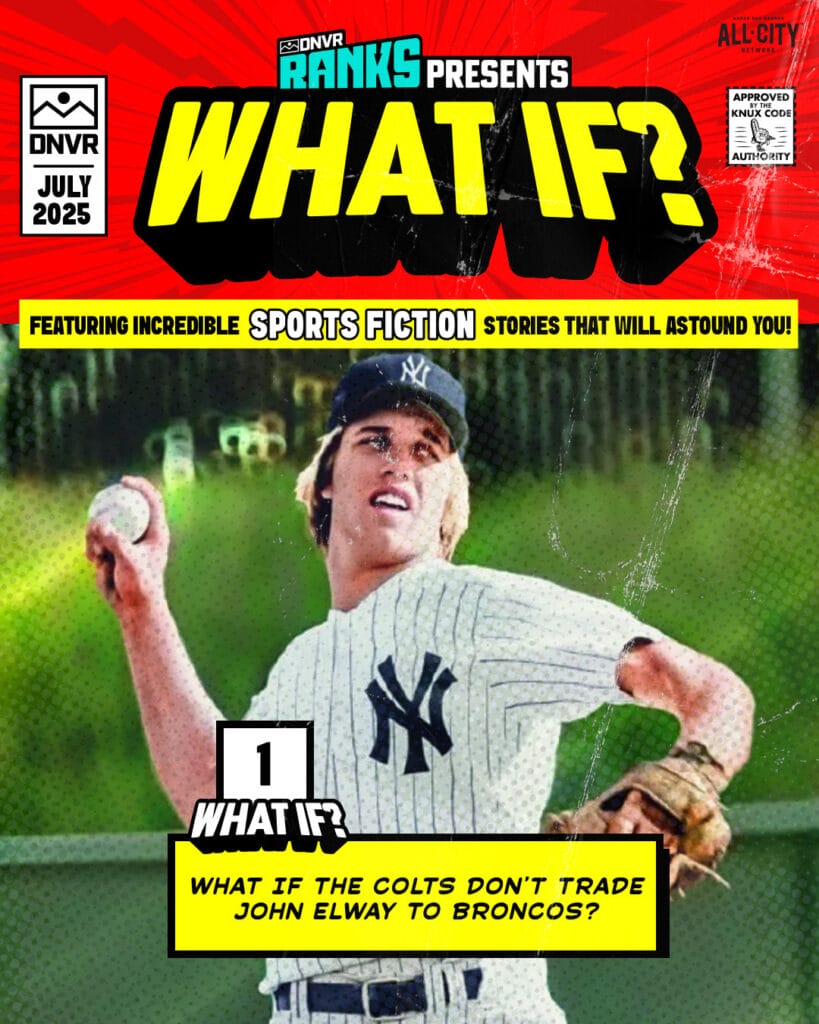
There are some crazy “What if?” questions on this list, but none is greater than this, and I don’t think it’s even close. The Denver Broncos had Floyd Little early in their existence and had one nice playoff run to the 1977 Super Bowl where they were beaten by the Dallas Cowboys, but that was about it for standout moments as an organization.
All of that changed in 1983 when the NFL Draft had a rocket-armed golden boy from California who understood his value better than almost any player in any sport before him. He knew his physical gifts were rare and he used that leverage to his benefit. He told the Baltimore Colts that if they drafted him with the 1st overall pick in the ’83 NFL Draft, he would go play baseball instead.
You see, Elway had been drafted by the New York Yankees in the second round of the 1981 MLB Draft and he was viewed as a legitimate baseball prospect. He played 42 games in Low-A for the Oneonta Yankees in 1982, hitting .318 and showcasing the skillset that made him such a tantalizing prospect. Still, Elway made it clear to the Yankees he preferred football.
When it came to possibly playing for the Colts, though, Elway made it even clearer that he’d happily choose baseball over going to such a moribund franchise. Colts GM Ernie Accorsi didn’t care and selected him anyway. Three picks later, the Broncos selected Chris Hinton, an offensive lineman. Elway continued to insist to the Colts he wouldn’t play for them, even telling the media, “As I stand here right now, I’m playing baseball.”
Eventually, the Colts relented and moved Elway to the Broncos in exchange for Hinton, quarterback Mark Herrman, and Denver’s first-round pick in 1984. While Hinton had an exceptional career, he was no Elway.
Elway brought legitimacy and star power to Denver and quickly paid dividends. He led the Broncos to Super Bowls in 1986, 1987, and 1989. They got shelled in each game, but there’s no denying they would never have gotten close to those games without Elway’s brilliance. He eventually got his championships after Mike Shanahan and Terrell Davis, among others, showed up to lead the Broncos to back-to-back Super Bowl titles in 1998 and 1999. If you want to read about the potential for a three-peat, you can do that here.
That’s one of the great stories in Denver sports history, but we’re here destroying those memories and asking what would have happened without Elway landing in Denver.
The obvious nightmare is that the Raiders land Elway, who nearly pulled off a trade for the top pick before the ’83 Draft, but any scenario that ends with Elway never becoming a Bronco is, frankly, sports nightmare fuel. Elway brought the kind of attention Denver never had before (David Thompson’s off-court problems did not help him) and brought new owner Pat Bowlen his golden boy.
If we’re being honest, Elway’s success in Denver also put Denver on the map as a sports city. Do we ever get the Colorado Rockies or Colorado Avalanche without Elway? Eventually, maybe, but there are no guarantees. The Broncos likely don’t play in five Super Bowls during Elway’s career (especially if he became a Raider or Charger, another team that nearly traded for him).
Shanahan’s unseemly exit from the Raiders in 1989 may never happen if he were coaching Elway and a healthy chunk of Broncos history disappears and is transferred (in some form) to the Raiders. Hinton probably goes on to have the same great career, but likely wouldn’t have the unique distinction of being traded for two number one overall picks (he was involved in a deal where the Colts landed the #1 pick in 1990 and selected Jeff George).
I suppose the other angle is the Colts never trade Elway, and he goes on to become a great Yankee, which is maybe the strangest alternate universe in all of this.
-AJ Haefele
Comments
Share your thoughts
Join the conversation




